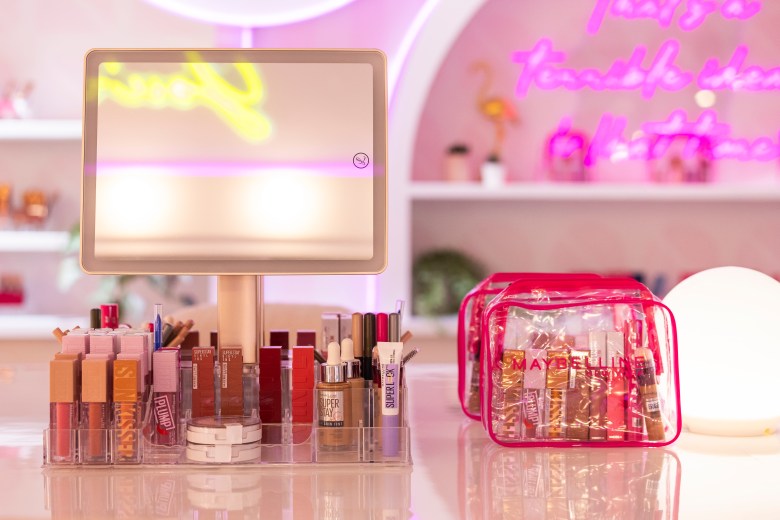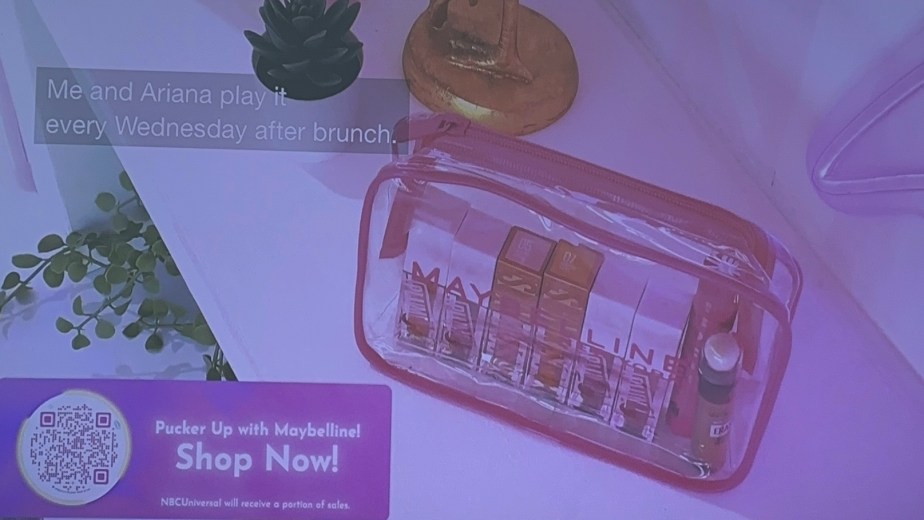This week, I checked in with Maybelline to glean insights into the results of its “Love Island USA” TV and streaming integration this summer, which included product placement, show sponsorship and traditional advertisements. Additionally, LVMH’s Sephora cuts 10% of jobs in China, a new hair-growth clinic secures $3.6 million in funding, and Angelina Jolie is the new face of Tom Ford Beauty.
With ‘Love Island USA’ and ‘The Bachelorette’ integrations, Maybelline successfully bolstered brand awareness this summer
Between the summer Olympics and the Republican and Democratic National Conventions, TV networks and streaming services faced extreme competition for eyes this summer. But despite numerous cultural moments playing out live for viewers from June to August, there was an unexpected winner in the mix: the sixth season of “Love Island USA.”
Over the course of two months — from its June 11 premiere to its August 19 reunion show — it became one of the buzziest reality show seasons in recent history. It was also the most-watched series of all time for NBCU streaming service Peacock, based on the number of minutes watched by viewers.
To add fuel to a summer of elevated TV viewing, “Love Island USA” brought on Ariana Madix, the buzzy star of “Vanderpump Rules” and “Dancing with the Stars,” to replace actress Sarah Hyland as its host. It also used the season to kick off a new sponsorship integration with L’Oréal-owned Maybelline New York.
“We want to make sure we’re top of mind in the conversations [happening now] and to break through to audiences in unexpected ways,” Jessica Feinstein, svp of marketing at Maybelline, told Glossy. “[Internally at L’Oréal], we’re talking a lot about how to integrate into popular culture. We say, ‘Move at the speed of culture.’ So for us, it’s beyond just product placement and sponsorships.”
In other words, Feinstein is looking for Maybelline to be a main character, not a background prop, when accepting integrations. “It’s not unique or different [to see someone on screen] just putting on a Maybelline mascara,” she said. “We’re considering questions like, ‘How do we tell the story authentically so it’s much more than just integrating products? How does the product fit into the storyline? How does the product become like a main character in the storyline?’”

To start, “the Love Island USA” dressing room was stocked with Maybelline products that were free for the cast to use and discuss. Feinstein told Glossy that all the islanders were given off-camera educational breakdowns on the products and their benefits from on-set makeup artists before filming, but no one was explicitly told to use any products. Makeup artists, it turns out, are on set to help islanders look camera-ready, although the castmates do their own glam. Getting castmates comfortable with the products prepared them for a surprise in episode 9: a Maybelline kissing competition.

This activation garnered Maybelline several organic comments about the brand from the islanders and product placement within the kissing competition, which included the kissing and scoring of other castmates while wearing blindfolds and Maybelline’s Lip Plump Lifter with Chili Pepper.

For Maybelline, the most alluring part of the integration was reaching an engaged audience watching in real-time, which allowed L’Oréal to see and respond to live commentary on social media.
“People are watching live, [which] makes such a huge difference, because it is culturally relevant right now,” Feinstein said. “People may be watching reruns in November or December, but they won’t be talking about it.” This timing also enabled Maybelline to partner with “Love Island” on joint handle posts, Feinstein told Glossy.
According to Maybelline, its integration on “Love Island,” as well as its third season of partnering with ABC’s “The Bachelorette” this summer, was all about brand awareness, with a smaller focus on sales and social conversions.

To help with the latter, NBC offered several pathways to purchase for consumers, including a QR code found on screen that led viewers to a digital Maybelline landing page featuring the products seen on the show. Maybelline does not sell direct-to-consumer, so the page directed shoppers to Maybelline retailers including Target and Walmart. Feinstein told Glossy that the metrics on this customer journey are still being analyzed.
“We’re not looking for short-term conversion with these types of programs, because if you rely on looking at your sales daily, dependent on this program, you’re going to be disappointed every time,” Feinstein said. “It’s more for long-term brand love, long-term brand awareness and maintaining relevance to the consumer, versus converting.”
According to Nielsen data provided to Glossy by NBCUniversal Media Group, “Love Island USA” became the No. 1 reality series in the U.S. across all streaming platforms between June 24-30, about a third of the way through the series rollout.
What’s more, “Love Island USA” became Peacock’s most talked about series based on social conversations across various social platforms, a rep from NBCUniversal told Glossy. While not broken up by season, there are currently more than 205 million TikTok posts that discuss “Love Island.” The show’s own account has around 174 million likes and 2.3 million followers.
The “Love Island” series started in the U.K., which now has 11 seasons. It follows the same formats of shows like “Big Brother” and “American Idol” with its high episode counts and prize winnings for participants securing the most viewer votes, the latter of which adds a layer of audience participation.
The success of “Love Island USA” plays into additional records this summer. For example, July 2024 boasted four of the top 10 most streamed days on record across all platforms, according to Neilsen ratings.
This all helped Maybelline to grow brand awareness that slowly impacts sales across sales channels. “[We want] Maybelline to become top of mind when [a shopper] walks into Target and says, ‘I saw that brand on ‘Love Island’ and it was so cute!’” Still, Maybelline did garner sales and saw a lift on Instagram, with 62,000 net new followers between June 1 and August 22.
Maybelline has several more TV activations this fall, Feinstein told Glossy. They are under wraps, for now, but will kick off in October. “[It’s all part of figuring out] how do you put Maybelline back into the cool consideration set,” Feinstein said. “As the largest makeup brand, we’ve seen so many of our competitors just fall because they haven’t maintained relevancy.”
Executive moves:
- Emily Bromfield is the new svp of global marketing for MAC Cosmetics. She previously held the role of CMO at Dr. Barbara Sturm’s skin-care range and global marketing and communications director for Charlotte Tilbury.
News to know:
- Great Many is the latest hair-growth clinic making waves in the beauty industry. On Wednesday, the clinic and platform announced it had raised $3.6 million in pre-seed funding. It also revealed a line of hair-care products and a new telehealth option for clients. The company launched in June of this year with one hair clinic in New York City. It was started by Michael Pollak, co-founder of Heyday skin-care bar, and Steve Klebanow, a former Estée Lauder Companies executive.
- Actress Angelina Jolie is the new face of Tom Ford Beauty. She will front campaigns for the brand’s Runway Lip Color, an existing line of 10 shades that will expand to 18 next month when her first campaign launches. It is the brand’s first celebrity spokesperson.
- Sephora is reportedly cutting around 10% of its workforce in China, or around 400 jobs. The LVMH brand, as well as many other Western beauty retailers and conglomerates, have not been immune to the challenging economic conditions across the APAC region. Sephora shuttered its operations in Taiwan in 2023 and in South Korea earlier this year.
- Therabody, the personal tech brand known for its Theragun body massaging tool, is continuing its expansion into beauty with its new TheraFace Depuffing Wand. The $149 beauty tool uses heating and cooling technology, which the brand said helps to depuff skin, brighten dark undereye circles, reduce the appearance of pores and increase product absorption. It will be sold DTC along with the brand’s LED Mask for $599. In addition, it will be sold with the TheraFace Pro, an all-in-one face massage and LED tool, for $399.
- Unilever is reportedly working with bankers at PricewaterhouseCoopers in the U.K. on the potential sales of two of its skin-care brands, according to Sky News. This includes Ren Clean Skincare and Kate Somerville Skincare, the latter of which also has a spa business in Los Angeles. Both brands were acquired by Unilever in 2015.
Stat of the week:
According to an analysis done by Reuters, Estée Lauder Companies’ shares delivered a total shareholder return of 566% during CEO Fabrizio Freda’s 16 years in charge. The news outlet reported that ELC’s stock is currently valued at 26 times expected earnings, which is just under competitors L’Oréal and Shiseido, which trade at 29 and 27 times, respectively.
This is one of many analyses being published online as shareholders assess the future while the company looks for a replacement before Freda’s announced 2025 retirement.
In the headlines:
Demure trend sparks brands’ acknowledgment of creators’ contributions to viral trends. Canopy, known for its humidifiers and showerheads, becomes the first home device brand to launch in Sephora stores. After 28 years at Estėe Lauder, Alexis Szabo starts prestige butt care brand Coco Fesse. The triumphant return of pressed powder. Designs For Health creates beauty supplement range to support aesthetics procedure results. If grants for Black-owned businesses are eliminated, your favorite beauty brands could be too.
Listen in:
Tennis star Sloane Stephens joins the Glossy Beauty Podcast to discuss Doc & Glo, a body-care line that debuted on Thursday with two innovative deodorant products.
Need a Glossy recap?
Michelle Phan’s new “Afterglow” podcast will be a counterculture ode to consciousness, personal development and internet culture. Serena Williams on her return to the U.S. Open — this time, as a beauty founder. Origins makes a bid for Gen Z with its new Youthtopia franchise. How Hillary Clinton won DNC night 1, according to social media. The power and politics of VP Kamala Harris’s hair. How brands are maximizing UGC for authentic, relatable BFCM campaigns.




